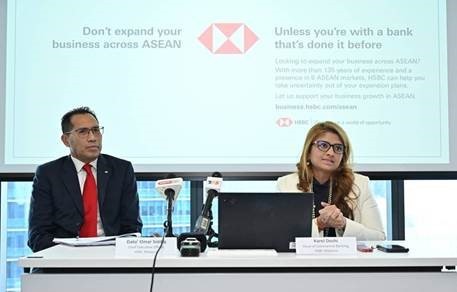
KUALA LUMPUR (March 27): HSBC has announced a US$1 billion Asean Growth Fund in six of the fastest growing countries in Asean, namely Malaysia, Singapore, Thailand, Indonesia, Vietnam and the Philippines.
Business growth and digitising operations are the main priorities for companies in Asean, based on a survey conducted by HSBC on 600 companies in the region.
“Asean remains a core growth engine for the globe, with a population of more than 670 million [people] and [maintaining] an average annual growth rate of 4.4%. Its potential is tremendous.
“We continue to see significant foreign direct investment (FDI) flowing into Asean and it remains a key trade and manufacturing hub,” said HSBC Malaysia chief executive officer (CEO) Datuk Omar Siddiq at the fund’s launch on Wednesday.
HSBC found that Asean businesses are looking at investing in technology and digitalisation, expanding into new markets in Asean, supply chain resilience, expanding into new business lines, and at research and development, the survey showed.
Hence, the bank is allocating US$1 billion of credit facilities through the dedicated lending fund to help the region’s companies scale up their business through digital platforms.
A key differentiator of the Asean Growth Fund is that it assesses the operating metrics tied to their cash-flow-generative asset portfolio, rather than solely rely on traditional financial metrics, said Omar.
“Typically, when we do lending or funding, there is a normal financial matrix that we follow. [However], for businesses which are new in the economy, they may not be profitable as yet, so we need to look at their operational funds. It’s a different assessment of the metrics of these groups of clients in the digital space, unlike the traditional metrics,” explained Karel Doshi, head of commercial banking at HSBC Malaysia, at the launch.
“We normally rely on the basic credit metrics which are based on the published accounting records. With this specific growth fund, we’re looking at operating metrics that are tied to cash flow generation.
“Understanding that sometimes, cash flow is not tied to accounting profit in a given year, and understanding where the source of funds [of the businesses] are coming from, we will be able to design a facility that is able to support them better,” added Omar.
The HSBC survey also found that 73% of respondents said that digitisation of operations is becoming more important compared to 2023. A total of 82% of the respondents plan to increase their investment in the digitalisation of their businesses in Asean.
“In Asean, the key economic driver is digitisation. The fund demonstrates our commitment to support players in the digital economy, as they scale their portfolio to expand not just in Asean, but beyond,” said Karel.
Source: https://theedgemalaysia.com/node/706166

